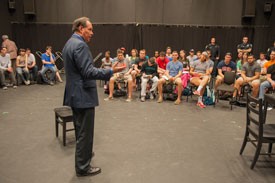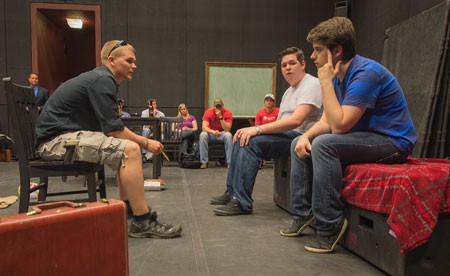Criminal Justice and Theater come together in conflict management exercise

Tod Burke explains the rules of the domestic dispute and conflict management roleplaying exercise to the assembled students, faculty and guests.
Criminal justice and theater students at Radford University had a chance to share their talents in a unique role playing exercise about conflict management and domestic disputes on Tuesday, April 1.
The exercise was staged in RU's Hawes Studio Theatre in Porterfield Hall. In three different scenarios, theater students improvised their roles as disputants and criminal justice students responded using knowledge from their studies.
Twists and turns abounded as the peacekeepers-in-training were thrown into a simulation of life on a police beat.
"This was definitely an eye opener," said Joe Stacey, sophomore criminal justice major from Reston. "I didn't know what to expect in the scenario and as soon as something went against plan, it was tough to know what to do."
This partnership is part of "Police and Society," a course in the RU Department of Criminal Justice that examines psychological, sociological and philosophical roles that police officers play in modern society.
"The Police and Society students play the role of responding officers who must mediate the situation," said Tod Burke, professor of criminal justice and associate dean of the RU College of Humanities and Behavioral Sciences. "At the conclusion of each 'domestic improvisation,' a debriefing is held before the entire class to reflect upon conflict management theory and its practical applications."
Stacey and his partner for the exercise, sophomore criminal justice major Isaiah Puckett, received an especially rude awakening in a rehearsal of a scenario when a disputant pulled an imaginary gun and shot both officers.

Criminal justice student Joe Stacey, left, works through a conflict management solution with theatre students James Bristow, rear, and Brandon Leatherland, right.
"I didn't see that coming in this scenario," said Puckett, of Ararat. "But it's great because I'm always going to keep it in mind. I'll remember that lesson."
By teaming up with acting students from the Department of Theatre and Cinema, the exercise took on an important added interdisciplinary focus. Not only did the criminal justice students get to put their studies to work, but the selected actors had a chance to hone their improvisation skills in a socially-conscious project.
"These criminal justice students were learning about how to settle a domestic dispute so we provided the framework for them," said sophomore Maddie Cindrich, theatre major from Virginia Beach. "It helped them learn how to properly perform this service."
Cindrich became involved in the project through the Radford Improv Club, of which she is a member. The club attempts to perform at least one of two community service projects per year and members were thrilled to be asked to participate in the domestic dispute role play.
"I'm excited because this was a great way for us as a club to reach out to the university and hopefully get the chance to do more important projects like this."
Wesley Young, associate professor of performance, helped identify acting students who would be up to the task at hand. "They are providing a 'close to real-life' experience for the criminal justice students that potentially sets them on the road to making decisions that might one day save their lives," he said.
Conflict management and the handling of domestic disputes are regular challenges for police officers. To help students understand their performance in the scenarios, representatives from both the RUPD and the Radford City Police, including both police chiefs, were invited to participate in the debriefings following each scenario.
The Department of Criminal Justice offers an interdisciplinary and professionally-oriented academic curriculum concentrating on many aspects of crime and the concepts that impact the system of justice. The program seeks to develop a broad foundation of knowledge pertaining to crime and its ancillary issues.
The Department of Theatre and Cinema is committed to the development of creative, independent, well-educated students who are able to use their art and work collaboratively to address the challenges of a dynamic society.